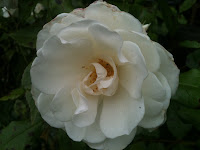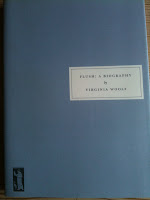 Funny things run in families, don't they? With me, it's the nose. Not something I'm thrilled about to be honest. But the older I get, the more I notice the nose... It is the exact spit of my mother's, my uncles AND my great aunts. Others get luckier and inherit the fabulously glossy chestnut curls, or the swan like neck, but, no, I get the nose. Ho hum. Well, of course in the case of the Keppels - it seems to be Royal lovers, but in the case of Camilla, she actually got to marry her prince. If Camilla has inherited anything from Alice Keppel and her daughter Violet let's hope for her sake it is an ability to be happy, as I think Mrs Keppel was, unlike her poor daughter - the lover of Vita, the lady novelist, the spoilt darling - Violet.
Funny things run in families, don't they? With me, it's the nose. Not something I'm thrilled about to be honest. But the older I get, the more I notice the nose... It is the exact spit of my mother's, my uncles AND my great aunts. Others get luckier and inherit the fabulously glossy chestnut curls, or the swan like neck, but, no, I get the nose. Ho hum. Well, of course in the case of the Keppels - it seems to be Royal lovers, but in the case of Camilla, she actually got to marry her prince. If Camilla has inherited anything from Alice Keppel and her daughter Violet let's hope for her sake it is an ability to be happy, as I think Mrs Keppel was, unlike her poor daughter - the lover of Vita, the lady novelist, the spoilt darling - Violet.After Sissinghurst, I re-read a novel by Violet Trefusis (who was the of course the daughter of the infamous Mrs Alice Keppel, who was the consort of the lusty King Edward V11) the novel in question was Challenge, and a jolly good read it is too... as are all her novels if read with an eye for the period and if one is in a forgiving mood about the huge amounts of snobbishness and casual racism that was rife then.
But - oh Violet - what a life!
In the wonderful biography by Diana Souhami - Mrs Keppel and Her Daughter, the most unlikely facts are thrown up. One of them is the simply appalling upbringing of Bertie, the Prince of Wales. Amongst his other extensive lessons were housekeeping, drill, archeology, gymnastics, calculating, drawing and - wait for it- bricklaying - which went on for seven hours a day six days a week (no wonder he went so badly off the rails as soon as he could) He had the most awful reports from tutors 'commonly averse to learning', 'wilful inattention' and 'anti-studious practices', which could easily have been my school report too, so I sympathise madly.
Of course by the time he got together with the voluptuous Mrs Keppel, Violet was in the nursery - though in later life, she dropped not very subtle hints that he was her father, claiming they had the same jaw line (family noses all over again) But this was not the case. She was not of royal blood. She could play with the Royal whiskers by the nursery fire and slide buttered crumpets down 'Kingy's' trousered legs. But she could not be his daughter.
Violet was dandled on laps, dressed in frills, taught French, music and art. What else did she need? Obviously she was going to marry well and that was considered more than enough.
Mrs Keppel was a shrewd judge of character and a money making machine. Her wealth, even by Edwardian standards, was huge. She was sensual and greedy and controlling, and covered all of this with the most amazing mask of manners. That was the way things were done. Etiquette ruled. The laws of class were upheld. Adultery was too common to be remarked upon, lovers being allotted joining rooms at weekends away. Fortunes were won and lost at the gaming tables, gentlemen shot pheasants, drank claret and the women were trained to amuse and quaff champagne, smile at risque jokes whilst wincing at the tightness of corsets. Servants outnumbered guests, but were seen and not heard. Just like the children.
But Violet proved to be no ordinary child.
She'd already chosen a priceless Doge's ring at an antique shop (making the owner blanch with dismay as he expected her to choose a doll) and her waywardness started early.
She was the temptress, the witch, the seducer who longed to be seduced, by Vita. It is a sad story of it's time. Violet and Vita lead a tortured love affair, high on passion and romance, fuelled by forbidden love - then Mrs Keppel steps in and promptly arranges a marriage to Denys Trefusis.
Poor Violet.
She expected Vita (married and with two small children herself) to save her. But she couldn't even save herself. Her life was not what she expected it to be. Still wealthy, still attractive and talented but with no discipline or ties, Violet drifted into obscurity, becoming a bore and a joke to her friends. She returned from her beloved France at the start of the war, leaving her adored home (Vita and Violet both bought towers, which I'm sure Freud would be chortling at) and then had to endure being recognised as Princess Sasha in Virginia Woolf's love-book ot Vita - Orlando. Sasha IS Violet. Deceitful, lying, duplicitous but no-one could resist such a siren. At least, it seems that no well born, high bred lesbian in England did. Violet had many conquests, but there was only one love in her heart and that remained unrequited. She had lost Vita to her husbnad, her children, her garden. Violet was left with nothing.
This is a wonderful book, giving clear insights to the manners and morals of the day. The heart-breaking letters are re-produced leaving one with a real sense of the passion that the two women went through and the turmoil and torment they caused for their families.
These are the words that Violet wrote about herself.
Accross my life only one word will be written: -"Waste"- Waste of Love, Waste of Talent, Waste of Enterprise.
I think she was wrong. Her books are more readable than Vita's. Her life was frittered away rather than wasted, but there's nothing wrong with a bit of frippery now and again...
















